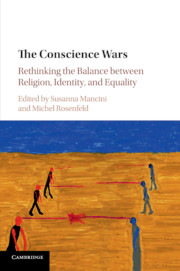
- Cited by 3
-
Cited byCrossref Citations
This Book has been cited by the following publications. This list is generated based on data provided by Crossref.
Greenhouse, Linda 2020. The Supreme Court’s Challenge to Civil Society. The Supreme Court Review, Vol. 2019, Issue. , p. 335.
Valero, María José 2022. Freedom of Conscience of Healthcare Professionals and Conscientious Objection in the European Court of Human Rights. Religions, Vol. 13, Issue. 6, p. 558.
Bielefeldt, Heiner Pinto, Thiago Alves and Petersen, Marie Juul 2022. Introduction: Freedom of Religion or Belief as a Human Right. The Review of Faith & International Affairs, Vol. 20, Issue. 2, p. 1.
- Publisher:
- Cambridge University Press
- Online publication date:
- June 2018
- Print publication year:
- 2018
- Online ISBN:
- 9781316780053
- Subjects:
- Constitutional and Administrative Law, Law, Human Rights


